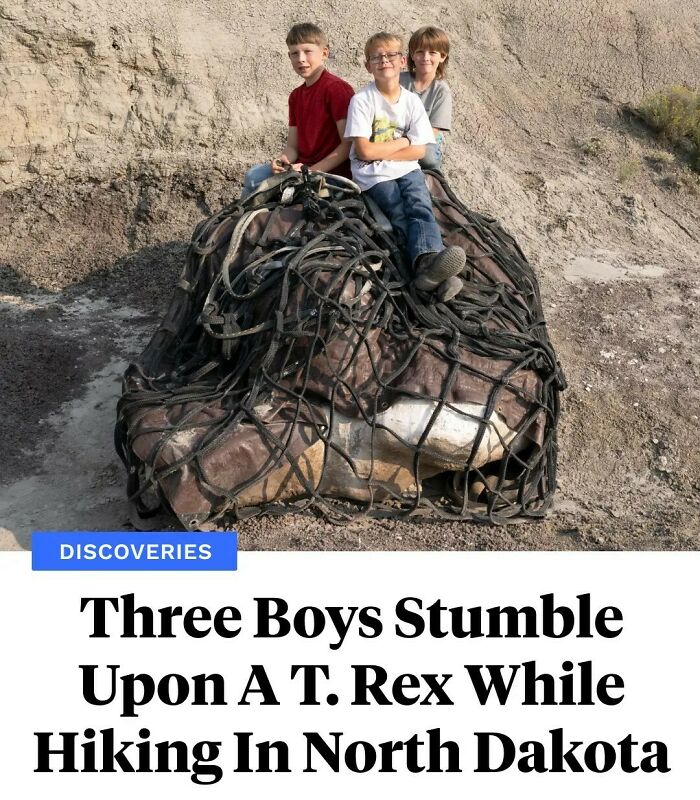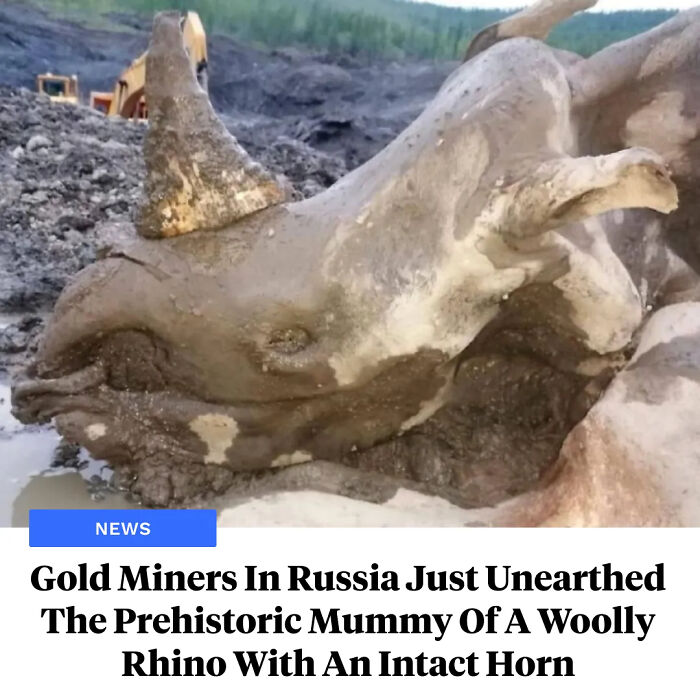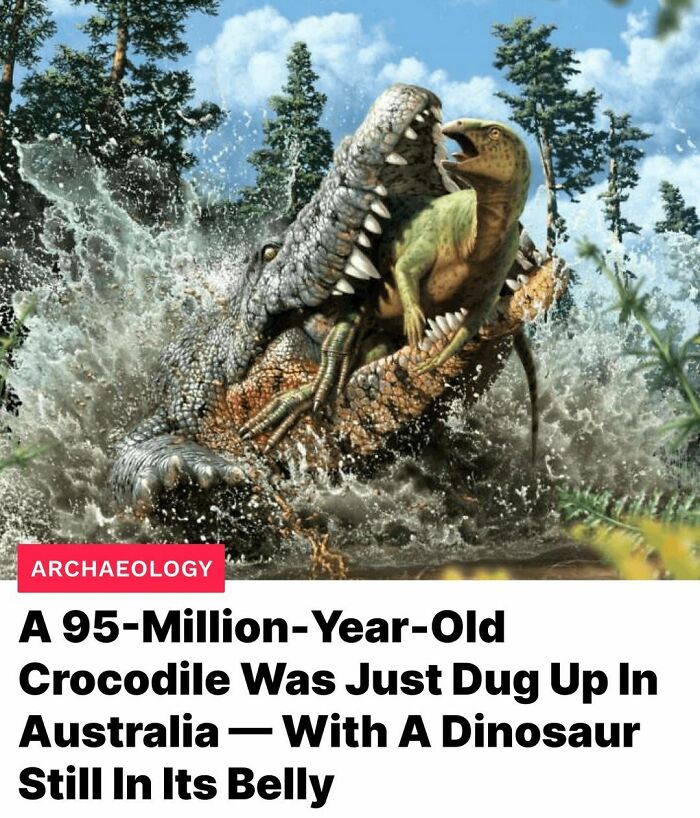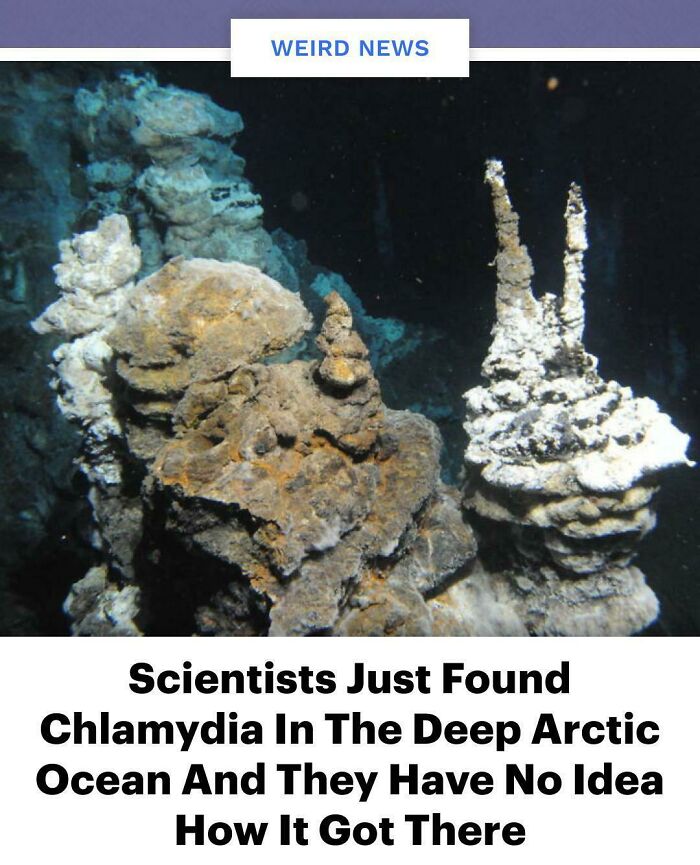Though people say that curiosity is what killed the cat, being curious often results in learning all sorts of fascinating stuff. Some sources suggest that it can even lead to a higher success rate in life!
If you’re a curious person yourself, you can probably attest that such people can be interested in a hundred things at once; they might be delving deeper into the subtleties of a certain animal species one minute and be watching documentaries about the New York City Ballet the next.
That’s why curious individuals are often fans of random fun facts and today, we have quite a few of them on this list, as shared by the ‘All That's Interesting’ Instagram account. Covering everything from volcano activity to wonders of the animal kingdom, and fascinating archeological finds—among other things—the facts ought to scratch your curious brain, so wait no longer, scroll down to find them and enjoy!
#1
In the 1950s, Ella Fitzgerald wasn't allowed to perform in Hollywood’s most popular nightclub, The Mocambo, because of her race. Marilyn Monroe called the owner and explained that if he booked Ella, she would be there every night. He booked Ella and Marilyn was there, front table, every single night as promised. Ella said, "After that, I never had to play a small jazz club again. She was an unusual woman, a little ahead of her time, and she didn’t even know it."

Image credits: all_thats_interesting
#2
A cat that befriended a herd of capybaras at a Malaysian zoo is now an official member of their enclosure. Oyen the cat first appeared with the other animals during the COVID-19 pandemic, and the capybaras seem to have adopted him as one of their own. With visits spiking as the cat and his new family have gained fame, the zoo has codified his interspecies adoption by putting up a sign reading "Capybaras & Oyen."

Image credits: all_thats_interesting
#3
Rosemary Hayne, a 39-year-old mother of four, recently pleaded guilty to misdemeanor assault after throwing a burrito bowl in the face of a Chipotle employee because her food looked "disgusting." Judge Timothy Gilligan wanted Hayne to face justice, but he also wanted her to gain "a sense of empathy," so he gave her a choice. She could either face a 90-day jail sentence or spend 30 days behind bars and 60 days working in a fast food restaurant. Hayne chose the second option — and now she will have to spend at least 20 hours per week dealing with fast food customers herself.

Image credits: all_thats_interesting
#4
In 1882, a Seychelles giant tortoise was gifted to William Grey-Wilson, the future governor of St. Helena. The creature was later named Jonathan, and he has since lived to see 30 more governors take office. Based on his size when he arrived on the island, experts believe Jonathan was born no later than 1832 — which means the 191-year-old reptile is both the world's longest living land animal and the oldest known tortoise to ever live.

Image credits: all_thats_interesting
#5
"I was, like, completely speechless." In July 2022, seven-year-old Liam Fisher, his 10-year-old brother Jessin, and their nine-year-old cousin Kaiden Madsen were out for a hike near the tiny town of Marmarth, North Dakota. The boys then saw what looked like a small fossil sticking out of the ground. Liam initially thought it was just a "chunk-osaurus," a made-up name these aspiring paleontologists created for any fossil fragment that's too small to identify. And when they showed it to a family friend, a paleontologist at a museum in Denver, he thought it might belong to a common duckbill dinosaur known as a hadrosaurus. But when the boys returned to the site and resumed their dig, they quickly came across a jawbone with enormous teeth sticking out of it — and soon realized that they'd actually uncovered a T. rex.

Image credits: all_thats_interesting
#6
On May 18, 1980, Washington's Mount St. Helens erupted in a cataclysmic blast that left 57 people dead and an area the size of Chicago completely devastated. That day, a freelance photographer named Robert Landsburg was just four miles from the summit when the volcano erupted, and he managed to capture a series of haunting images as a tidal wave of ash and hot gas raced toward him. Ultimately, when he realized he wasn't going to survive, Landsburg used his final moments to make sure that his photos would, so he shielded the film with his body.

Image credits: all_thats_interesting
#7
The 1883 eruption of Indonesia's Krakatoa volcano was so gargantuan that it's almost impossible to comprehend. The loudest sound in recorded history, it ruptured the eardrums of people more than 40 miles from the epicenter, created a sound wave that circled the globe seven times and could be heard all the way in New York City — more than 10,000 miles away. And even those around the world who didn't hear the blast still reported seeing the sun turn purple, the moon turn blue, and the sky turn red. In fact, the sky grew so red as far away as Connecticut that one local fire department was dispatched to put out what they were sure was a blaze burning somewhere right in town. From calamity to heroism to the just plain bizarre, these lesser-known history facts will take you inside the most interesting moments from humanity's past

Image credits: all_thats_interesting
#8
Just before the start of the 544-mile Sydney to Melbourne Ultramarathon in 1983, one particular runner caught the attention of the Australian media: a 61-year-old potato farmer named Cliff Young. He had shown up before the race wearing overalls and work boots, telling journalists that he had trained in his large rubber boots and had spent much of his childhood chasing after sheep, sometimes for days without rest. Soon after the race began, Cliff Young fell behind the other runners and seemed on track to finish dead last. But after getting just two hours of sleep the first night, Young got back up and started running — and didn't stop. While the other runners stopped each night to sleep, Young kept moving continuously at his slow pace for five days straight. "I'm just an old tortoise," he said. "I have to keep going to stay in front." In the end, Young won the race in record time, smashing the previous mark by two whole days and leaving the entire world stunned.

Image credits: all_thats_interesting
#9
"I thought he was dead… But he's here, and that's by the grace of God." A four-month-old baby was just found alive after being sucked up into a tornado. The twister had struck the family's mobile home in Clarksville, Tennessee on December 9, tearing the roof off of the building and taking baby Lord with it. Though Lord's parents were certain he must be dead, they soon found him cradled in a nearby tree with only a few cuts and bruises.

Image credits: all_thats_interesting
#10
"It is a truly unprecedented discovery and one of the greatest finds in British palaeontological history." Paleontologists in England have uncovered the remains of a prehistoric sea monster larger and more complete than anything ever found in the country before. Its head alone is about twice as heavy as a grizzly bear while its entire body is longer than a school bus. What's more, researchers now believe this 180-million-year-old discovery may just be the "tip of the iceberg," and that both this ichthyosaur's last meal and its unborn offspring may be sitting inside its enormous stomach.

Image credits: all_thats_interesting
#11
What trenches from World War 1 look like today. One hundred years after the end of World War 1, some of northeastern France remains uninhabitable for humans today. Called Zone Rouge, the area is saturated with unexploded ordinance, while the soil remains heavily polluted by lead, mercury, arsenic, and the decomposing corpses of humans and animals. In some sections, the ground is so polluted with arsenic that 99% of plant life is unable to survive.

Image credits: all_thats_interesting
#12
Russian gold miners were recently excavating a new quarry in Siberia when they spotted something completely unexpected in the permafrost: a mummified woolly rhino. The creature's horn was still intact, as were some of its soft tissues. Woolly rhinos went extinct in the region more than 10,000 years ago, so the level of preservation seen in the specimen is extremely rare — and it may even allow scientists to extract DNA

Image credits: all_thats_interesting
#13
Researchers in Australia were trawling the Winton Formation, a nearly 100 million-year-old geological rock bed, for sauropod bones when they accidentally stumbled upon something remarkable. Preserved in siltstone was about 35 percent of a prehistoric crocodile, including the entire skull. The fossil had been partially crushed, but that damage also revealed dinosaur bones — inside the creature's stomach. It took delicate work with X-rays, CT scans, and computer modeling to recreate the tiny creature inside the crocodile, but eventually, researchers found it was an ornithopod. Small, beaked plant-eaters that lived 100 million years ago, ornithopods were some of the most successful and evolved herbivores of the Cretaceous period — though this one ended up in the belly of a crocodile.

Image credits: all_thats_interesting
#14
"The otter was shredding, caught a couple of nice waves." Over the past few years, reports of a renegade otter stealing surfers' boards have emerged around Santa Cruz, California. But those reports have skyrocketed since mid-June as this ill-tempered sea otter has reached a new level of aggression. This five-year-old female has commandeered several surfboards in recent weeks, and while some surfers have enjoyed their experiences with the animal, otter specialists are quick to emphasize the danger of such a close encounter. With razor-sharp teeth and jaws strong enough to crush clams and mussels, they pose a clear threat to the surfers — but the risk goes both ways. If the otter were to bite a human, the state would be forced to euthanize her. Signs now line the coast warning surfers of the threat: "Aggressive Sea Otter In This Area. Enter The Water At Your Own Risk."

Image credits: all_thats_interesting
#15
In mid-August, archaeologists were excavating a medieval site in the Icelandic village of Seyðisfjörður when they made an astonishing discovery. Buried in the floor of an old longhouse was a small animal figurine measuring just an inch tall and two inches long. Carved from volcanic rock, this artifact appears to resemble a bear or a pig, though some have suggested that it could be a dog. Now, researchers believe it was likely a toy, making it a remarkably rare discovery

Image credits: all_thats_interesting
#16
"I honestly can't believe you're alive. It really makes no sense." Cladophialophora bantiana is a rare, subtropical fungus that can attach itself to the brain — and 31-year-old Tyson Bottenus of Rhode Island is now living with just one of about 120 cases in recorded history. Also known as "black mold" because of how it appears on brain MRIs, the fungus causes seizures, headaches, and strokes — and is almost always fatal. Bottenus himself suffered one stroke so severe that he had to re-learn how to walk, speak, and read from scratch. Doctors are still treating his case aggressively — and they're astounded that he's still alive.

Image credits: all_thats_interesting
#17
"She was an old lady. I ate it because it was well sealed, right? But I've been feeling so weak since then. My heart is racing. I've thrown up. But I have this taste in my mouth… So bitter. Bad. My vision is blurry. I'm so weak." Fernanda Silva Valoz da Cruz Pinto was walking through the city center of Maceió, Brazil on August 3rd when she met an old woman who claimed to be a fortune teller. Pinto stopped to have her palm read — and the woman told her she had only a few days left to live. At the end of the session, the fortune teller gave Pinto a chocolate, which the 27-year-old accepted. But only a few hours after eating the candy, Pinto suddenly came down with a set of bizarre symptoms. She felt dizzy, had blurred vision, and began vomiting and foaming at the mouth — and chillingly, just as the fortune teller predicted, Pinto died at the hospital the following day. Now, two months later, toxicology reports have revealed that Pinto had high concentrations of toxic pesticides in her body when she died — and her family believes the "fortune teller" poisoned her.

Image credits: all_thats_interesting
#18
Invasive raccoons with a penchant for beer have been running rampant in Germany, breaking into homes, causing thousands in damage, and even killing some pets. The "unbelievably adaptable" animals, first introduced to the country around 90 years ago, have comfortably adjusted to the country. Efforts have long been underway to curb the raccoon population, but eradication seems out of the question as they've become a "plague in some parts of the country."

Image credits: all_thats_interesting
#19
The horse was found in full saddle suggesting that it was being prepped to rescue those fleeing the volcanic eruption.

Image credits: all_thats_interesting
#20
Researchers in Mexico have found the deepest ocean sinkhole on planet Earth — and it's so deep they haven't even hit the bottom yet. The Taam Ja' Blue Hole is located in Mexico's Chetumal Bay, near the border with Belize and not far from the world-renowned Great Blue Hole. However, with a depth of at least 1,378 feet, Taam Ja' is more than three times deeper than its famous neighbor. What's more, scientists don't even know how much larger that staggering measurement will get, as they couldn't even reach the bottom because their instruments simply couldn't descend that far. But once they do hit the bottom, experts believe they'll find an interconnected labyrinth of caves and tunnels unlike anything ever seen before.

Image credits: all_thats_interesting
#21
Researchers in China have uncovered 1,300-year-old cannabis inside the tomb of an ancient warrior. Though cannabis was cultivated widely throughout ancient China for its nutritional value and its seeds were often consumed in a porridge, this particular strain was chosen for its psychoactive properties. Now, this rare discovery is confirming longstanding theories about cannabis' use as a mind-altering drug in ancient China

Image credits: all_thats_interesting
#22
In April 2024, a user named Kidipadeli75 posted to Reddit, claiming that he had found what appeared to be a human jawbone embedded in the floor tiles of his parents' home. "My parents just got their home renovated with [travertine] stone," the user wrote, alongside a photo of the bone. "This looks like a section of mandible. Could it be a hominid? Is it usual?" A bit of research soon revealed that the travertine limestone tiles had come from the Denizli Basin in western Turkey, where researchers have previously uncovered fossils of everything from prehistoric human remains to mammoths. Incredibly, the stone within this quarry was formed between 0.7 million and 1.8 million years ago, indicating that the jawbone could be more than a million years old.

Image credits: all_thats_interesting
#23
"It's really special because generally the soft tissues, the skin, the organs, tendons, they don't preserve in the fossil record. So this is something really unique." Scientists were thrilled to find a partial fossil of a duck-billed hadrosaur in a rocky hillside in Alberta, Canada, and they were even more delighted to learn that an extremely rare full skeleton may still be entombed in the stone. But perhaps the most unique part of the discovery was the layer of rough skin that still covered the dinosaur's tail and hind leg. Now, paleontologists are excavating the rest of the fossil, hoping that the find will help them determine what hadrosaurs really looked like.

Image credits: all_thats_interesting
#24
While the average person's IQ hovers somewhere around 100, a horse rancher from Missouri named Christopher Langan has scored as high as 210. Though he may not be a household name, Langan is often recognized as the smartest person in the United States and perhaps the world. However, Langan also subscribes to a variety of bizarre conspiracy theories. Not only does he claim to be able to prove the existence of god, but he preaches the racist "white replacement theory," 9/11 "trutherism," and anti-vaccine messaging. In fact, over the past decade, Langan has become a minor star on the far right, with some describing him as "Alex Jones with a thesaurus."

Image credits: all_thats_interesting
#25
A robot gorilla was sent to spy on wild gorillas in Uganda and filmed them singing at dinner and farting uncontrollably. In order to convince the gorillas that the robot was one of them, its creators rubbed it in feces and gave it realistic eyes.

Image credits: all_thats_interesting
#26
The Perth Museum in Scotland and London's British Museum just restored what is believed to be the only surviving complete example of a kahu kākāpō, a traditional Māori cloak made from the feathers of a flightless parrot native to New Zealand. Kākāpō became critically endangered as settlers hunted the birds for their meat and introduced predators like cats, dogs, and stoats to the islands. The cloak was likely created from the parrots' feathers in the early 19th century and worn by individuals of high status for ceremonial purposes. It was donated to what is now the Perth Museum in 1842, and now restorers have spent more than 100 hours using scalpels and magnifying glasses to return the kahu kākāpō to its former glory.

Image credits: all_thats_interesting
#27
Researchers in Egypt just uncovered the long-lost top half of an enormous limestone statue of Ramses II, one of ancient Egypt's most celebrated rulers. The previously missing portion of the statue stands over 12 feet tall and depicts Ramses II's head, shoulders, and upper torso. He is shown wearing a double crown known as a pschent, signifying the ancient pharaoh's dominion over Egypt, as well as a uraeus, a headdress associated with the goddess Wadjet. When put back together with its lower half — which was discovered in the same area in 1930 by German archaeologists — the statue is expected to be roughly 23 feet tall.

Image credits: all_thats_interesting
#28
Marion Stokes believed that the news held crucial historical details at risk of disappearing forever — so beginning around 1979, the former librarian and civil rights activist began obsessively recording television broadcasts 24 hours a day. For 30 years, Stokes purchased countless tapes, loaded them into her recorder, and let the television run all day long. Every six to eight hours — depending on the length of the tape — she quickly swapped the tape out for a new one. Sometimes, this meant rushing home early from a meal to ensure she didn't miss a second of a broadcast. Gradually, she bought more and more TVs so she could document multiple programs at once until she was recording from eight different devices. Meanwhile, by investing in Apple stock, Stokes saved enough money to buy as many as nine additional apartments, which she used to store her approximately 71,000 tapes.

Image credits: all_thats_interesting
#29
While exploring the sea floor off the coast of the uninhabited Sicilian island of Vendicari, underwater archaeologists spotted what looked to be an oddly shaped rock. But upon further inspection, the researchers realized that this "rock" was actually a metal battle helmet. Now dated to between the 15th and 17th centuries, the helmet is covered in layers of mineral cement but otherwise intact.

Image credits: all_thats_interesting
#30
Conservators working to restore Sir Joshua Reynolds' 1789 painting The Death of Cardinal Beaufort just discovered a hidden demon lurking in the shadows of the artwork. It may have unintentionally faded into the background as at least six layers of varnish were added over the years — or it may have been purposely overpainted by 18th-century conservators who "misunderstood" the devilish figure.

Image credits: all_thats_interesting
#31
In the 1970s, scientists uncovered the fossilized remains of a massive prehistoric salmon called Oncorhynchus rastrosus in Oregon. Researchers could tell that the fish had inch-long teeth, but they were separated from the jaw, so they weren't sure how they'd been attached. The scientists assumed they curved downward, similar to a saber-toothed tiger — but newly-discovered fossils just revealed that the fish's teeth actually protruded laterally like a warthog's tusks.

Image credits: all_thats_interesting
#32
In 2019, a family in the Spanish town of Carmona was renovating their home when they stumbled upon a 2,000-year-old tomb from the Roman era right in their backyard. The six urns found inside all contained cremated human remains, but one of them also held a mysterious reddish-brown liquid that has now been identified as the world's oldest wine ever found. A white wine not unlike some of the sherries still produced in the region to this day, this particular wine has deepened in color over the course of two millennia, but has otherwise remained fresh. In fact, the wine is still drinkable after 2,000 years — so the researchers decided to taste it.

Image credits: all_thats_interesting
#33
Workers were recently removing invasive plants during a dune restoration project at a park in Knokke, Belgium, when they struck concrete just inches beneath the ground's surface. Further excavations revealed three German bunkers from World War II that had been buried after the conflict ended in 1945. Alongside the bunkers, archaeologists unearthed two brick trenches, a water well, and part of a concrete path as well as utensils, cables, and ammunition from the war. After measuring and documenting the finds, researchers covered them with sand once more to preserve them for the future.

Image credits: all_thats_interesting
#34
"This was a pretty weird forest — not like any forest you would see today." Researchers in England just discovered fossil evidence of the oldest forest in the world. Dated to about 390 million years, the prehistoric forest belonged to a geological period known as the Devonian period. This age marked a major change for life on Earth, in which the first seed-bearing plants appeared and the first four-legged amphibians made their way onto land. As such, this early forest looked a bit different from the ones we're familiar with. Known as Calamophyton, the fossilized trees were something like "prototypes" of modern trees. Researchers say they would have looked like palms, but with thin trunks and hollow centers.

Image credits: all_thats_interesting
#35
"What on Earth are they doing there?" Scientists searching the depths of the Arctic Ocean for any signs of life happened upon an abundance of chlamydia and some of it was related to the variety that causes the STI in humans. How it survived in one of the most inhospitable places on Earth that's devoid of virtually all other life remains a mystery

Image credits: all_thats_interesting
#36
The National Museum of Ireland recently received a mysterious package in the mail from an anonymous sender — and opened it to find two ax heads that date to between 2150 and 2000 B.C.E. The donor included a note stating that they had found the artifacts in central Ireland using a metal detector, but they didn't include any other details. It is illegal to search for archaeological treasures with a metal detector in the country without written permission from the government, so museum officials believe the person who found the ax heads wants to stay anonymous to avoid trouble. However, they are now asking the sender to contact them so they can better understand the true significance of the Bronze Age artifacts.

Image credits: all_thats_interesting
#37
Paleontologists in India just identified a gargantuan prehistoric snake that roamed the Earth 47 million years ago. The largest living snake on Earth today is the reticulated python, with the longest specimen ever found measuring in at nearly 33 feet — but Vasuki indicus grew anywhere from 36 to 50 feet in length. The massive creature had at least 800 vertebrae and likely killed its prey through constriction. Although scientists aren't sure what exactly Vasuki feasted on, they found creatures like ray fish, turtles, crocodilians, and primitive whales within the same fossil layer that may have served as its food source.

Image credits: all_thats_interesting
#38
"On the leg, the skin was hanging. You could see the bone." Construction workers laying concrete in Wasco, California last Friday were stunned when they saw a man walking down the sidewalk — with a human leg. They captured video of the bizarre incident that shows 27-year-old Resendo Tellez seemingly biting into a severed foot before waving it at police officers. Tellez allegedly stole the limb from the scene of a nearby train collision that left a pedestrian dead, and he's now facing charges for removing evidence from the scene

Image credits: all_thats_interesting
#39
A citizen scientist just stumbled upon a brand new moth species in a West London park. The brown moth was given the name "Tachystola mulliganae" after Barbara Mulligan, the enthusiast who discovered it. DNA analysis showed that this specimen was a perfect match for another unnamed specimen found in Western Australia in 1886 — though it's not entirely clear how this little insect made the journey from Western Australia.

Image credits: all_thats_interesting
#40
"The animal would have been so massive that I think it would have been able to prey effectively on anything that was unfortunate enough to be in its space… I have no doubt that this was sort of like an underwater T. Rex." Scientists just uncovered a massive, 150-million-year-old pliosaur skull along England's Jurassic Coast. An apex predator, the pliosaur was an aquatic reptile believed to have hunted plesiosaurs, dolphin-like creatures called ichthyosaurs, and even other pliosaurs. This prehistoric sea monster would have been "about the size of a doubledecker bus" at 32-39 feet long and had jaws powerful enough to kill its prey in a single bite. The newly discovered skull alone is nearly seven feet long and contains about 130 razor-sharp teeth, each of which is ridged at the back to help it slice into its prey.

Image credits: all_thats_interesting
#41
For decades, archaeologists working all over northern Europe have been finding centuries-old swords inlaid with a mysterious inscription simply reading "Ulfberht." Made of a special mixture of carbon steel, these blades boast exceptional power and durability, with many swords remaining stunningly intact even after 1,000 years. And although these Ulfberht swords were so well-crafted that they couldn't be recreated until the Industrial Revolution, experts still don't know who made them or where. Now, workers dredging a river in Poland just opened up a new chapter in this enduring mystery when they happened upon an Ulfberht sword in the Vistula River in Włocławek. Though some researchers have theorized that this sword may have belonged to a Viking warrior, its exact origins remain mysterious, just like all the Ulfberht swords unearthed before it.

Image credits: all_thats_interesting
#42
A dolphin that appears to have "thumbs" was recently spotted off the coast of Greece — and it has experts baffled. All dolphins have bones within the soft tissue of their flippers that are similar to human fingers, but this specific creature seems to be missing the equivalent of its index and middle fingers, making the thumb-like protrusions visible. Scientists don't think it was injured, so the deformation is likely the result of genetics, perhaps due to interbreeding among the three species of dolphins that live in the Gulf of Corinth.

Image credits: all_thats_interesting
#43
“We know a reasonable amount about crucifixion ... But it’s the first tangible evidence to actually see how it worked.” Archaeologists in England have just found the best evidence yet of the gruesome practice of crucifixion. A 25 to 35-year-old man who was crucified some 1,800 years ago during the Roman era was unearthed in Cambridgeshire with a nail still in his foot. Scientists believe he was a slave or prisoner who spent most of his life in shackles due to injuries and inflammation on his legs. At some point, it's likely the man crossed either a boss or captor — and was made into a gruesome example, with the nail hammered in to stop him from "wriggling." And although Romans typically removed nails from crucifixion victims in order to reuse them, in this case, the nail bent and became stuck in the man's bone.

Image credits: all_thats_interesting
#44
An archaeologist studying the ancient Roman Forum in Corinth, Greece, just identified one of the buildings within it as a prison. Matthew Larsen examined historical records from the excavation of the site in 1901 and graffiti found on the floor to determine that it is likely one of just a few surviving prisons from the Roman world. The graffiti, which is written in Greek, was seemingly carved by inmates — and much of it includes curses against the people who imprisoned them. One inscription reads, "May the fortune of those who suffer in this lawless place prevail. Lord, do not show mercy on the one who threw us in here," while another simply says, "Lord, make them die an awful death."

Image credits: all_thats_interesting
#45
The oldest person to ever live, Jeanne Calment reached the age of 122 before dying in her hometown of Arles, France in 1997. But along the way, she eschewed conventional medicine, smoked cigarettes until she was 117, and enjoyed a diet rich in red meat, wine, and two pounds of chocolate per week, saying, "I took pleasure when I could." But is Calment's story too crazy to be true? Due to inconsistencies in her story, some have claimed that Calment's title as the oldest person to ever live may actually be a hoax, and that "Jeanne Calment" was actually that woman's daughter, who assumed her mother's identity upon her death in 1934.

Image credits: all_thats_interesting







